Digestive health is fundamental to the health of your entire body. According to Chinese Medicine, the Earth element, which includes the Spleen and Stomach, is considered to be the central element in the Five Element system. Earth corresponds to the late Summer as well as to all seasonal transitions. This is why it's especially important to take care of your digestive health during all transitions, seasonal and otherwise.
The health of your digestive system, or gut health, is the foundation of your ability to properly digest and assimilate food, manage stress and sleep well.
Gut health is directly impacted by stress because of a mechanism known as the gut-brain axis, which explains the biochemical signaling between the gastrointestinal tract and the central nervous system.
Under stress, the hypothalamus in the brain signals the autonomic nervous system as well as the pituitary gland to produce stress hormones, including epinephrine and cortisol. The production of these stress hormones shuts down the parasympathetic nervous system, which is related to our ability to rest and to digest.
When the sympathetic nervous system, or our 'fight or flight' response, is active, the parasympathetic nervous system is impeded and therefore both our sleep and digestion are impacted.
You probably know from experience that your thought process, especially when you’re under stress, affects your ability to digest food, but this relationship goes both ways.
In other words, what you eat also impacts your ability to think—and sleep.
Sleep and the Gut-Brain Axis
The bidirectional communication between the brain and central nervous system (CNS) and the enteric nervous system (ENS) is known as the gut-brain axis (GBA), an information superhighway of chemicals and hormones that provides constant feedback and informs, among other things, our moods, emotions and sleep patterns.
Recent research on the gut-brain axis (GBA) affirms that an unhealthy microbiome in the gut impacts sleep quality and that poor sleep causes changes to the bacterial community in the gut. This is because sleep deprivation produces an imbalance of the stress hormone cortisol.
Too much cortisol can lead to a proliferation of unhealthy bacteria microbiome that can lead to gastrointestinal (GI) problems. GI imbalances increase the potential to develop sleep disorders.
In addition, research has shown that there is 400 times more melatonin in the gut than there is in the pineal gland where melatonin was traditionally thought to be produced. It appears that stress causes changes both in gut bacteria and in neurotransmitter levels (Beckett, 2015).
The rhythms of gut microbes are affected by diet, both the timing of eating and the composition of foods consumed. A healthy diet helps the body generate more beneficial gut microbes thereby helping to reduce inflammation and optimize gut health.
The health of the gut helps determine the health of the brain and therefore our ability to process information, manage stress, balance our emotions, and digest and assimilate food; all of which affect our ability to sleep.
Unbalanced Emotions and Sleep
Li Dong-yuan, Founder of the Earth School in Chinese Medicine and one of the Four Great Masters of the Jin-Yuan period in China, believed that disease pathology manifests as a result of damage to postnatal Qi, the energy that we refine and consume through our environment from food and drink. Postnatal Qi is produced by the Spleen and Stomach through the Gu Qi, or energy that's transformed from food. This process occurs in the gut.
Excessive or unbalanced emotions and stress weaken the Spleen and Stomach and therefore the gut. According to Li Dong-yuan, this weakness leads to stagnation of Stomach Qi that eventually turns into heat or Fire that burns the fluids in the body.
We can therefore surmise that heat accumulation in the gut eventually affects the brain and interferes with the harmonious interplay between the gut and brain.
During menopause for example, hormone production decreases and, since damage to the gut inhibits the proper production of melatonin and other hormones necessary to regulate stress and sleep, there is a great tendency for a woman to develop insomnia at this time.
Li believed that weakness in the Spleen and Stomach, or Earth organs, is the foundation of disease and begins with unresolved emotions. He stated that "the downward flowing [of the five yang qi] into their confinement with yin fire in kun earth is always due first to damage done by the five thieves -- joy, anger, sorrow, worry, and fright--followed by stagnation of stomach qi. Finally, overtaxation and dietary irregularity succeed in damaging the original qi" (Li, 2004, 203).
The “five thieves” damage the Spleen and Stomach, leading to stagnation of Stomach Qi. Overwork or overtaxation and poor diet further damage the original qi. This pattern is prominent during major life transitions like menopause during which, as Dr. Christiane Northrup has explained, many women’s unprocessed and unresolved emotions cause insomnia and fatigue to accompany “the enormous changes of midlife” (Northrup, 2012).
This internal heat caused by Qi deficiency is called Yin Fire and flares up into heart. This pattern is common among women going through the menopausal transition where stress along with hormonal changes damage the Spleen and Stomach function.
Yin Fire: The Impact of Emotions on Your Health
According to Nei Jing Su Wen, one of the foremost classical Chinese medical texts, seven emotions are considered major internal causes of disease - joy, anger, fear, fright, anxiety, pensiveness and sadness. Li Dong-yuan focused on what he referred to as the “five thieves,” or the emotions of joy, anger, sorrow, pensiveness, and fright, any of which in excess become pathological.
The Earth attribute of Yi, or the mind, has a tendency to worry. Nei Jing Su Wen stated: “Pensiveness harms the spleen” (Unschuld, 2011, 207) and if it is not properly transformed, it leads to obsession.
The attribute of the Heart is known as the spirit, or shen. Over-joy, which includes excessive desires and passions, can overwhelm the Heart and disrupt the shen, since the Heart is the organ that manages joy. Over-joy can transform into anxiety and eventually mania.
Yin Fire causes excessive emotions to aggravate the Heart, which then dumps heat into the Stomach. As the abode of the shen, or spirit, the Heart’s disturbance will affect the circulation of blood and thus the shen, inhibiting one’s ability to sleep restfully.
Wei Qi, which determines the body’s circadian rhythm, forms in the Lungs through the Gu Qi that first enters the Stomach via food and drinks. The circadian rhythm, like the circulation of Wei Qi, dips and rises at different times of the day and can be impacted by the pathological process of Yin Fire.
Sleepiness and sleep propensity are strongly influenced by our circadian clock as indicated by circadian rhythms, most commonly by that of core body temperature. Sleep is most conducive in the temperature minimum phase, but is inhibited in a "wake maintenance zone" before the minimum phase, and is disrupted in a zone following that phase. Different types of insomnia symptoms have been associated with abnormalities of the body temperature rhythm (Lack et al., 2008).
Yin Fire results from Qi deficiency heat caused by poor diet, over taxation, and imbalanced emotions (Li, 2004, 86). Over time, Yin Fire creates an internal heat that can burn up the body’s blood, qi and yin and cause insomnia, especially because its ascending quality affects the Heart and Pericardium. It can also inhibit a decline in core temperature, which is essential for falling asleep (NIH, 2005).
Internal heat can also arise from Yin deficiency wherein insufficiency of body fluids prevents the body from cooling or tempering the heat, or Yang energy, in the body.
Think of Yin Fire as a process of inflammation that slowly erodes the internal membrane of the intestinal wall. As this membrane barrier breaks down, the gut lining becomes hyper-permeable and leads to the problem of Leaky Gut Syndrome. An abnormally leaky gut allows molecules of partially digested food as well as microbial toxins like bacteria, virus and fungus to flow directly into the bloodstream. These foreign invaders lead to overactive immune responses by the body which can lead to a host of serious diseases such as cancer or chronic degenerative conditions like autoimmune disorders.
If you’re dealing with chronic inflammation of any kind, it's imperative to clean up the toxic terrain within your gut and heal the intestinal lining.
Healing the Gut, Brain and Sleep
One effective way to support the process of healing a leaky gut and build back a healthy microbiome for improved digestion and elimination is through the ingestion of bone broth.
Bone broth is a food source packed with substrates to help bind up the intestinal wall, referred to as the Yin of the Stomach in Chinese Medicine. Yin is substance, so we need substance to heal the body's broken down tissues. Bone broth contains the following substances to repair and restore your muscles, skin, joints and gut health:
Protein - supplies the building blocks for growth, including the building of muscles, tissues and new cells.
Glycine - an amino acid necessary for healthy DNA and RNA that's essential for properly functioning cells.
Collagen - holds together our joints, bones, ligaments and tendons. Needs to be supplemented as it starts to diminish as early as age 20.
Chondroitin Sulfate - supports joint health and comfort (especially in combination with glucosamine)
Glucosamine - a compound that's involved in the creation of molecules that form cartilage.
Hyaluronic Acid - a compound contained in the synovial fluid in our joints that serves as a cushion and lubricant in the joints and other tissues. Hyaluronic acid is also a major component of skin, where it is involved in tissue repair and wound healing.
Furthermore, bone broth comes from slowly cooking down bones to provide different types of collagen depending upon the animal source of the bones. In Chinese Medicine, the bones relate to the Kidney system and the Kidney system also supports the brain. So we can see a correlation with how the regular ingestion of bone broth can be very nutritional to strengthen brain function as well.
Other important supplements that support gut restoration include probiotics and digestive enzymes (contact us to learn more about products we recommend that are available at our clinic).
A healthy diet rich in omega fatty acids, leafy green vegetables and limited complex carbohydrates (especially gluten free) will also help to develop a healthy gut microbiome .
Self-care is also crucial to heal the digestive system, as the ability to care for oneself and others is a virtue of the Earth element. Learning to cook healthy meals at home, receiving regular Acupuncture treatment and taking time for cultivation practices such as Yoga and Qi Gong will help to regulate both the nervous and digestive systems.
With a calm mind and healthy gut, a good night's sleep will naturally become a more regular part of your life.













